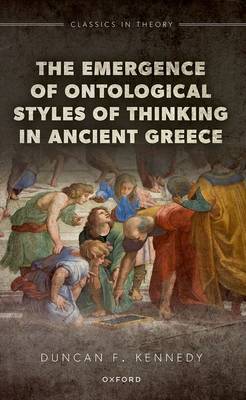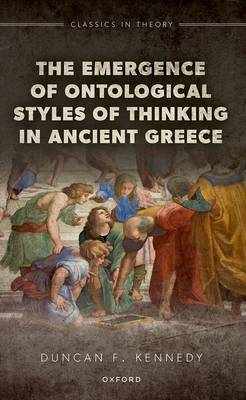
- Afhalen na 1 uur in een winkel met voorraad
- Gratis thuislevering in België vanaf € 30
- Ruim aanbod met 7 miljoen producten
- Afhalen na 1 uur in een winkel met voorraad
- Gratis thuislevering in België vanaf € 30
- Ruim aanbod met 7 miljoen producten
Zoeken
The Emergence of Ontological Styles of Thinking in Ancient Greece
Duncan F Kennedy
€ 209,45
+ 418 punten
Omschrijving
This book presents an innovative theoretical framework for exploring the intellectual culture of ancient Greece in the period 450-350 BC. The bewildering questions and surprising opportunities posed by emergent styles of ontological thinking at this time, about issues of being and becoming, of presence (what is or is not there for us), and about different modes of existence, moulded the divergent responses of figures such as Herodotus and Thucydides, Parmenides, Protagoras, and Democritus, as well as cultural practices such as tragedy, and the fiercely abstract thinking of the early Greek geometers and mathematicians. Many new ways of seeing were being created, and, with them, new objects and modes of inquiry. Taking its cue from the historical 'ontological turn' in the humanities, as seen in the work of, amongst others, Tristan Garcia, Ian Hacking, and Bruno Latour, it challenges existing narratives of the development of Greek thought that continue to reflect the metaphysical agenda created by Plato and Aristotle in the fourth century BC, responses those earlier thinkers could not have foreseen, and which can frequently be shown to be highly tendentious. Their texts are instead located in contemporary fields of sense that draw attention to details that suggest different lines of development, the traces of which can be detected even in receptions that are hostile. Dynamically linking ancient and modern thought, the book is accessible to a broad readership interested in how disciplines now taken for granted (including history, philosophy, anthropology, and mathematics) first emerged as distinct styles of inquiry.
Specificaties
Betrokkenen
- Auteur(s):
- Uitgeverij:
Inhoud
- Aantal bladzijden:
- 256
- Taal:
- Engels
- Reeks:
Eigenschappen
- Productcode (EAN):
- 9780198985051
- Verschijningsdatum:
- 18/03/2026
- Uitvoering:
- Hardcover
- Formaat:
- Genaaid
- Afmetingen:
- 145 mm x 224 mm
- Gewicht:
- 439 g

Alleen bij Standaard Boekhandel
+ 418 punten op je klantenkaart van Standaard Boekhandel
Beoordelingen
We publiceren alleen reviews die voldoen aan de voorwaarden voor reviews. Bekijk onze voorwaarden voor reviews.







